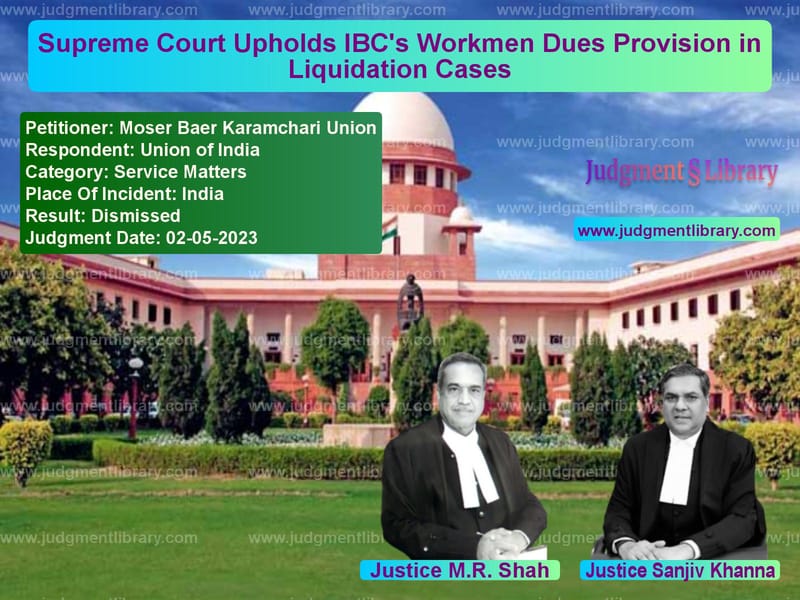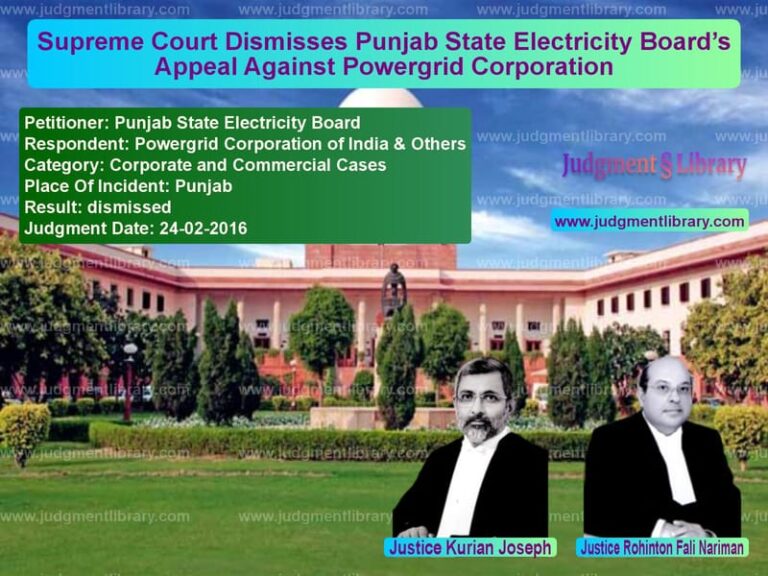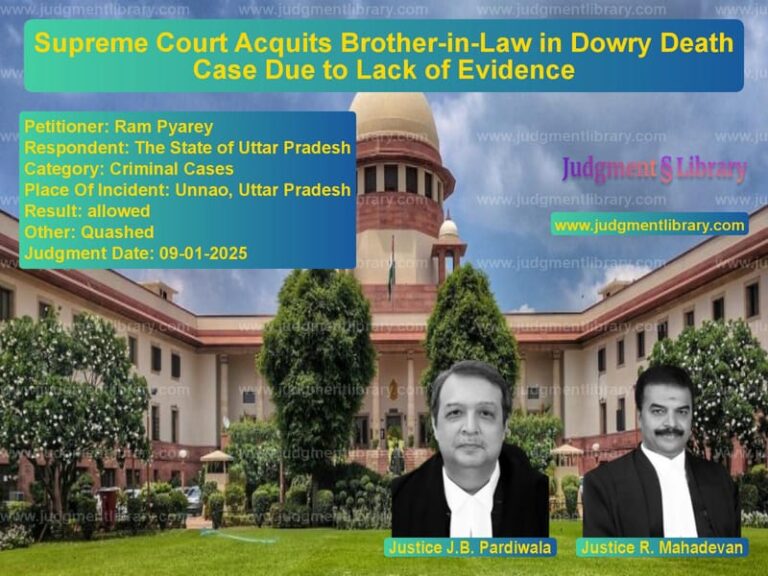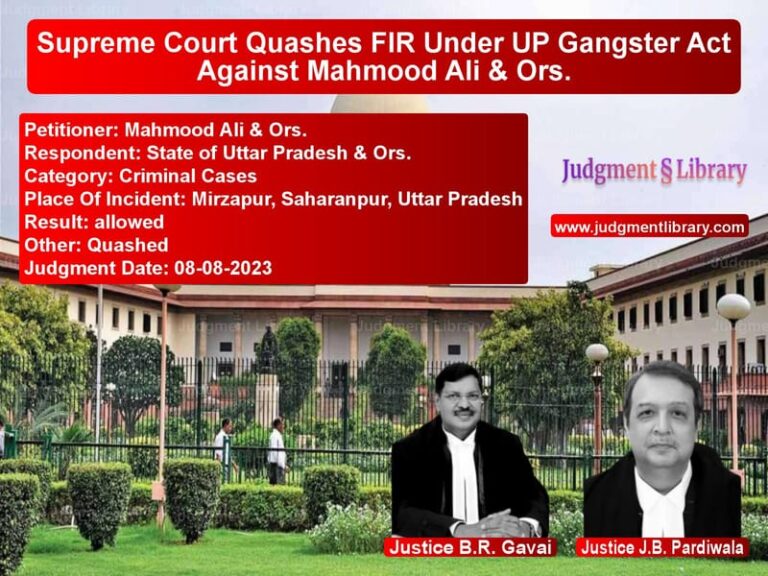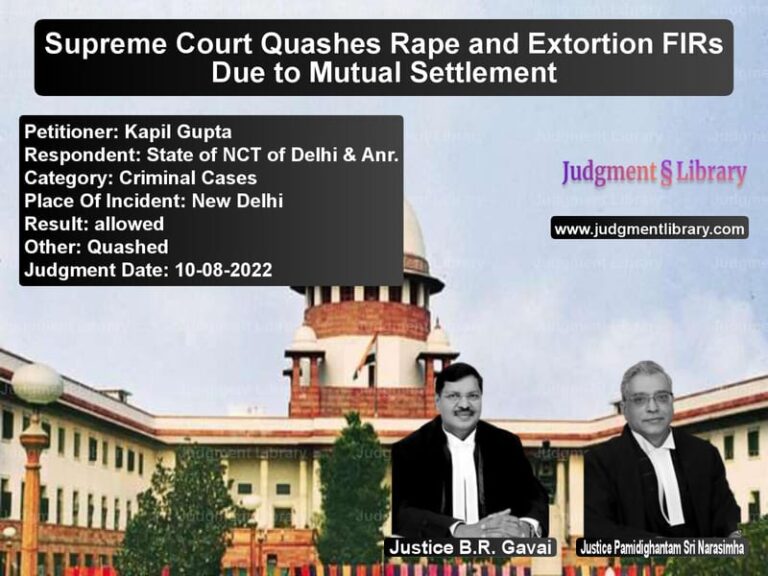Supreme Court Upholds IBC’s Workmen Dues Provision in Liquidation Cases
The case of Moser Baer Karamchari Union v. Union of India & Ors. involves the challenge to Section 327(7) of the Companies Act, 2013 and the waterfall mechanism under Section 53 of the Insolvency and Bankruptcy Code, 2016 (IBC). The Supreme Court was called upon to determine whether the provisions governing the payment of workmen’s dues in the event of liquidation were arbitrary and unconstitutional under Articles 14 and 21 of the Constitution.
This judgment is significant as it establishes the validity of the IBC’s provisions and clarifies the distinction between liquidation under the Companies Act, 2013 and liquidation under the IBC.
Background of the Case
The petitioners, including the Moser Baer Karamchari Union, filed a writ petition under Article 32 of the Constitution challenging Section 327(7) of the Companies Act, 2013, which excludes the applicability of Sections 326 and 327 in cases of liquidation under the IBC. They argued that:
- Workmen’s dues should be given overriding preferential payment even under the IBC, as provided in the Companies Act, 2013.
- The waterfall mechanism in Section 53 of the IBC, which places workmen’s dues for 24 months on par with secured creditors, is discriminatory.
- Workmen should be entitled to their dues for the entire service period, not just 24 months before liquidation.
The Union of India defended the IBC’s framework, arguing that the law was carefully designed to balance the rights of various stakeholders, including secured creditors, workmen, and the government.
Petitioners’ Arguments
The petitioners, represented by Senior Advocate Gopal Sankaranarayanan, argued:
- The exclusion of Sections 326 and 327 from IBC liquidation cases arbitrarily denies workmen their rightful dues.
- The IBC unfairly ranks workmen’s dues below secured creditors, reducing their ability to recover outstanding wages.
- Workmen should receive their entire dues and not be limited to just 24 months of arrears.
- The preferential treatment given to secured creditors violates the principle of equality under Article 14.
Respondent’s Arguments
The Union of India, represented by Additional Solicitor General Balbir Singh, countered:
- The IBC was enacted to create a streamlined and efficient insolvency resolution process.
- The exclusion of Sections 326 and 327 from IBC cases prevents conflicts between different liquidation frameworks.
- Workmen’s dues for 24 months preceding liquidation are given priority alongside secured creditors, ensuring fair treatment.
- The IBC’s structure was developed through extensive consultations, and its provisions align with international best practices.
Supreme Court Judgment
The case was heard by Justice M.R. Shah and Justice Sanjiv Khanna. The Supreme Court upheld the validity of Section 327(7) of the Companies Act, 2013 and the waterfall mechanism in Section 53 of the IBC.
1. IBC as a Comprehensive Code
The Court ruled that the IBC is a complete code for insolvency and liquidation and that it overrides conflicting provisions in other laws. It stated:
“IBC provides a structured, time-bound process for liquidation. The exclusion of Sections 326 and 327 from IBC liquidation cases ensures consistency and prevents conflicting provisions.”
2. Workmen’s Dues Under the IBC
The Court found that workmen’s dues are protected under the IBC:
“Workmen’s dues for 24 months preceding liquidation are given pari passu ranking with secured creditors. This balances the rights of workmen while maintaining fairness to other creditors.”
3. Social Security Protections
The Court noted that the IBC specifically protects workmen’s social security funds:
“Provident Fund, Pension Fund, and Gratuity Fund are excluded from the liquidation estate under Section 36(4) of the IBC, ensuring these benefits remain intact for workmen.”
4. Economic Rationale for Workmen’s Dues Cap
The Court acknowledged that economic considerations influenced the decision to limit workmen’s dues to 24 months:
“The IBC is designed to maximize asset value and ensure a fair distribution among all creditors. Extending workmen’s dues beyond 24 months would disrupt this balance.”
5. No Violation of Article 14
The Court rejected the argument that Section 53 of the IBC is discriminatory:
“The classification of workmen’s dues alongside secured creditors is based on economic rationale and is not arbitrary. The IBC’s framework is a result of extensive legislative deliberation.”
Final Verdict
The Supreme Court dismissed the petitions, ruling:
- Section 327(7) of the Companies Act, 2013 is constitutional.
- The waterfall mechanism in Section 53 of the IBC is valid.
- Workmen’s dues for 24 months preceding liquidation are adequate protection.
- The IBC’s exclusion of provident fund, pension fund, and gratuity from liquidation estates safeguards workers’ rights.
Conclusion
This judgment reaffirms the IBC’s position as the governing framework for insolvency and liquidation in India. By upholding the waterfall mechanism, the Supreme Court has ensured that workmen’s dues receive fair treatment while maintaining economic stability. The decision also underscores that insolvency laws must balance the rights of multiple stakeholders, ensuring both financial recovery and protection for workmen.
Petitioner Name: Moser Baer Karamchari Union.Respondent Name: Union of India.Judgment By: Justice M.R. Shah, Justice Sanjiv Khanna.Place Of Incident: India.Judgment Date: 02-05-2023.
Don’t miss out on the full details! Download the complete judgment in PDF format below and gain valuable insights instantly!
Download Judgment: moser-baer-karamchar-vs-union-of-india-supreme-court-of-india-judgment-dated-02-05-2023.pdf
Directly Download Judgment: Directly download this Judgment
See all petitions in Employment Disputes
See all petitions in Pension and Gratuity
See all petitions in Judgment by Mukeshkumar Rasikbhai Shah
See all petitions in Judgment by Sanjiv Khanna
See all petitions in dismissed
See all petitions in supreme court of India judgments May 2023
See all petitions in 2023 judgments
See all posts in Service Matters Category
See all allowed petitions in Service Matters Category
See all Dismissed petitions in Service Matters Category
See all partially allowed petitions in Service Matters Category

